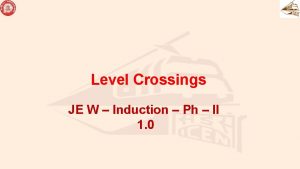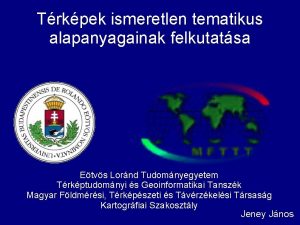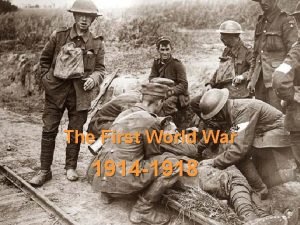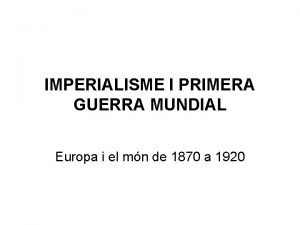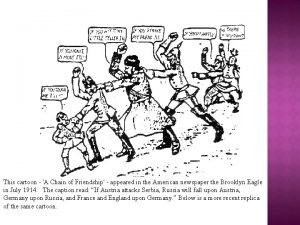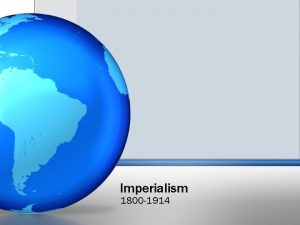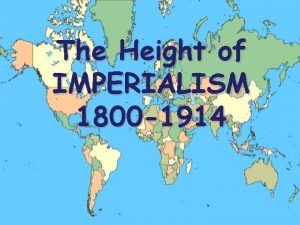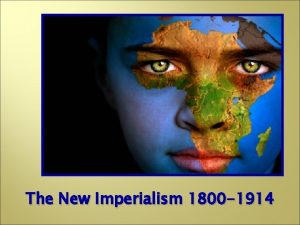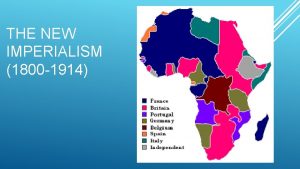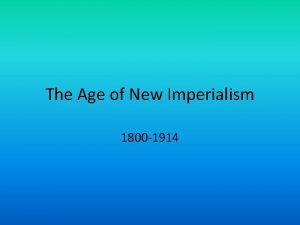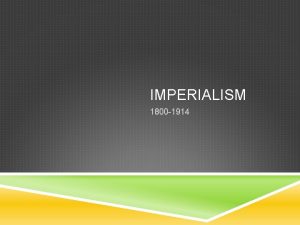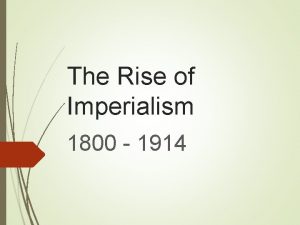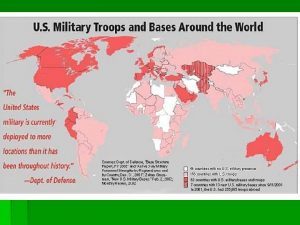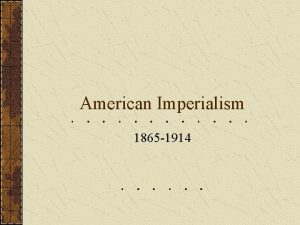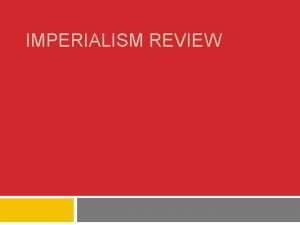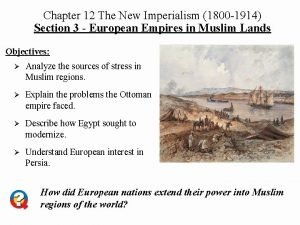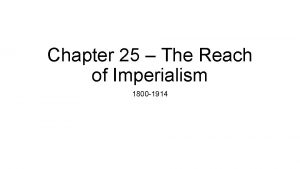Chapter 21 Height of Imperialism 1800 1914 Chapter


















- Slides: 18

Chapter 21 Height of Imperialism 1800 -1914

Chapter 21 Imperialism and its impact on the world. What might be some effects of imperialism?

The New Imperialism page 686 � Time period 1880’s � Focus: IMPERIALISM-seizure of a country or territory by a strong country � Europe began to view Asia & Africa as a source of raw materials & markets for industrial manufactured goods.

� Motives p 686 -687 Imperialist motives ◦ economic motive ◦ heated European power rivalries-colonies =power & national pride. ◦ social Darwinism & racism ◦ white mans burden to bring our advancement through a religious & humanitarian approach. “ The path to progress is strewn with the wrecks of nations; traces are everywhere to be seen of the inferior races. Yet, these dead people are the stepping stones on which mankind has arisen to the higher intellectual and deeper emotional life of today. ” A British Professor

Implication of Imperialism �Forms of Control ◦ Colony- gov. internally by foreign power ◦ Protectorate – own internal gov that is controlled by outside power=Protection ◦ Sphere of Influence-outside power claims trading privileges ◦ Economic control – controlled by Private business interest rather than other govs.

Implications of Imperialism � Methods of Management ◦ Indirect Control �used existing political leaders �Local leaders trained in controlling powers gov style �Hope – eventually local pop gov themselves �Usually cheaper & preserved culture ◦ Direct Control �Local leaders replaced with Imperialist countries leaders

Imperial Colonies � Imperial powers didn’t want colonies to develop industry � Colonial policy stress exportation � Plantation agriculture ◦ Local people(low wages)=profit for owner

Imperialism in Africa EMPIRE BUILDING IN AFRICA

West Africa � West Africa ◦ Europeans need raw materials. �Peanuts, timber, hides and palm oil ◦ 1800’s slave trade declined=new trade interests ◦ France & Great Britain were the 1 st to take interest in the west coast

� North Africa ◦ Egypt became independent from Ottomans 1805 ◦ Modern reforms � 1854 Suez Canal (connect Mediterranean with Red Sea) �British interested in Egypt & Canal (life line to India). �Egypt revolts-became a British protectorate in 1914. � French controlled Algeria &Tunisia, a protectorate over Morocco. � Italy takes Libya , fails with Ethiopia

Central and East Africa Central Africa � David Livingstone ◦ Explorer-find river route to open central Africa �Christianity & Commerce ◦ Replaces by Henry Stanley Detested Africa Congo Route � King Leopold II of Belgium ◦ Claims territories of the Congo ◦ Rubber �

Central and East Africa � Britain vs Germany ◦ Germany late to race ◦ Britain wanted to connect colonies north to south ◦ To settle conflicting claims the Berlin Conference met. �recognized British & German territory in East Africa. �

� The South Africa Boers, or Afrikaners (descendants of Dutch settlers occupied Cape town. ◦ later seized By British (Cape Colony. ) � Angered Boers mover North (Great Trek) ◦ 2 Republics �Orange Free States �Transvaal �Battled with Zulu

South Africa � Cecil Rhodes � 1880’s British policy influenced by him. � Promoted British expansion. Rhodesia � Discovered gold & diamonds � Started Boer War –wanted to connect Cairo and Cape by rail � The Boer War � British vs Boer. � British won-1910 independent Union of South Africa.

Effects of Imperialism � By 1914 only Liberia & Ethiopia were Free � Lost of culture-assimilation � Social class tensions-old elite � segregation � Emergence of nationalism ◦ New Urban educated class �Western education �See importance of western ways �Want equality & own identity

21 -2 Review � “life-line to India” � Suez Canal � By 1914 the only independent states in Africa were what? � Liberia and Ethiopia � Incorporate a country within another state? � Annex � In the late 19 th century, the real driving force behind colonization of Central Africa was who? � Leopold II of Belgium

21 -2 Review � After opening the Suez Canal in 1869, Britain took an active interest in what country? � Egypt � Medical missionary and explorer in Africa � David Livingston � After its defeat in Ethiopia in 1896, Italy seized what? � Tripoli � Dutch settlers in South Africa � Afrikaners � 19 th century Egyptian ruler � Muhammad Ali

21 -2 Review � Britain, Germany, and France all had colonies where by 1900? � West Africa
 Imperialism map 1914
Imperialism map 1914 Chapter 14 the height of imperialism
Chapter 14 the height of imperialism Africa 1890
Africa 1890 Old imperialism motives
Old imperialism motives Lc gate height gauge
Lc gate height gauge W.w. norton
W.w. norton In 1914, who controlled the shaded areas on the map?
In 1914, who controlled the shaded areas on the map? Európa térképe 1914-ben
Európa térképe 1914-ben Colonial empires 1914
Colonial empires 1914 Dinant 1914
Dinant 1914 Balcanes 1914
Balcanes 1914 Topovsko pitanje
Topovsko pitanje Picasso apollinaire
Picasso apollinaire Causes del colonialisme
Causes del colonialisme Svjetska književnost od 1929 do 1952
Svjetska književnost od 1929 do 1952 Hrvatska književnost od 1914 do 1952
Hrvatska književnost od 1914 do 1952 Picasso ma jolie 1914
Picasso ma jolie 1914 Colonial empires 1914
Colonial empires 1914 The chain of friendship cartoon analysis
The chain of friendship cartoon analysis




